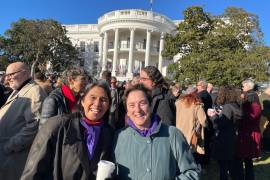Employees across the country have come to rely upon the availability of basic employment leave benefits (such as paid sick leave, paid vacation leave, paid parental leave and paid short-term disability leave) to make their lives manageable.
But one important paid leave-related work policy that is often off the radar of both employees and the policies of their employers is paid family leave, or leave that employees can take to care for loved ones while still receiving pay. Many employees don’t consider the need for paid family leave until the day a loved one is struck with a serious illness or injury, requiring time off to care for their loved one.
And when the need for paid family leave arises, unfortunately, the need is largely unmet.
Bureau of Labor statistics reveal that among civilian workers, only 15% have paid family leave access. While federal law generally provides under the Family and Medical Leave Act that employers must allow employees to take off up to twelve weeks per year to care for a spouse, child or parent who is suffering from a serious health condition, that law only requires that unpaid leave be granted in such circumstances. Not many states provide paid family leave either.
And many employees cannot afford to sacrifice their entire paycheck to care for loved ones in need of their assistance, even for shorter periods of time.
Paid leave policies are essential – not just to those in traditional nuclear family structures, but also to those with chosen families.
A chosen family can look like a myriad of different things, including committed unmarried couples, those in non-traditional family structures such as polyamorous families and foster or kinship parenting.
People living with disabilities – including disabled people living with HIV and LGBTQ people – are often part of chosen families, and are disproportionately more likely to need and request family leave. Indeed, in a recent 2017 study and accompanying report, People Need Paid Leave Policies That Cover Chosen Family, the Center for American Progress (CAP) documents that “fewer than 20 percent of households adhere to the so-called nuclear family model of a married couple and their minor children.”
The report further documents that “32 percent of people in the United States report having taken time off work to care for a friend or chosen family member with a health-related need.” In addition, the CAP survey reveals that “forty-two percent of LGBT individuals report doing so, a significantly higher rate than non-LGBT individuals at 31 percent,” and 42 percent of people living with disabilities report doing so, as compared to 30 percent of people not living with disabilities.
The CAP report concludes that “extending paid leave to those who need time off to care for health needs of chosen family members would have a significant positive impact on two communities with experiences of marginalization – LGBT people and people with disabilities.”
The vast majority of states lack paid family leave policies altogether.
The National Conference of State Legislatures reported in 2016 that only three states — California, New Jersey and Rhode Island — had state laws requiring paid family leave. California was the first, originally passing its paid family leave law in 2002 and recently expanding its coverage to increase the percentage of wages paid during the leave time.
Since then, as CAP noted in a 2016 report, Making Paid Leave Work for Every Family, Arizona voters approved a paid “sick and safe time” law that – while not categorized as a family leave law per se – does ensure that Arizona workers can use their paid “sick and safe” time to care for family, defining family inclusively to extend not just to blood relatives but also to chosen family under the affinity model. The law defines “family” as “any other individual related by blood or affinity whose close association with the employee is the equivalent of a family relationship.”
While not explicitly designed paid “family leave,” Arizona’s paid sick and safe time law is still recognized as “the first statewide paid leave law to cover chosen family,” and it is estimated by CAP that the state “will cover nearly 2.6 million workers with the enactment of Ariz. Rev. Stat. § 23-371(H)(5) (2016).”
On January 1, 2018, New York will become the latest state to require that employers provide paid family leave to their employees. However, Arizona remains the only state to require paid leave for chosen families, although not explicitly designating the leave as paid family leave.
Although the Family and Medical Leave Act does not provide for paid family leave at the federal level, another law does – but only for federal employees.
Under the Federal Employees Family Friendly Leave Act (FEFFLA), paid leave protections also cover chosen families, in addition to blood relations, spouses or domestic partners or other more traditional family units.
The FEFFLA defines those family members for whom a federal employee may receive paid leave to care for as including: Spouse, and parents thereof; Children, including adopted children, and spouses thereof; Parents; Brothers and sisters, and spouses thereof; and Any individual related by blood or affinity whose close association with the employee is the equivalent of a family relationship.
As CAP describes, this paid sick leave policy for federal employees, “which includes chosen family, has been in place for more than 20 years, and research has shown that this policy improves employee morale and increases workplace efficiency without substantially increasing sick time usage.”
An increase in paid leave policies that include coverage for non-traditional or chosen family structures is essential for the wellbeing of our country’s overall workforce.
Lambda Legal is proud to support such policies, in particular because they would clearly benefit LGBTQ people and everyone living with HIV – especially those with health conditions needing family members’ care.
We call on states that lack paid family leave laws altogether to adopt such laws, and to – like the State of Arizona and the Federal Employees Family Friendly Leave Act – define “family” to include chosen families.
But of course, the simplest solution would be for Congress to adopt such a law for the country as a whole.





